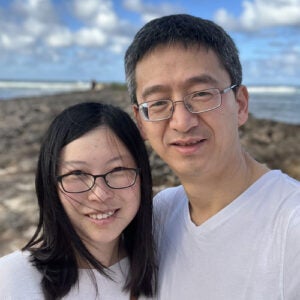
Ling Qi (right) with Iris Sun
Ling Qi, PhD, was appointed chair of the Department of Molecular Physiology and Biological Physics effective September 1, 2023. Dr. Qi came to UVA from the University of Michigan Medical School, where he served as a professor in the Department of Molecular & Integrative Physiology and the Department of Internal Medicine. He also served as president of the Chinese American Diabetes Association, chair of a National Institutes of Health study section and chair of the Biomedical Research Council at University of Michigan Medical School and was elected as a fellow of the American Association for the Advancement of Science in 2021.
Dr. Qi brings incredible expertise as a scientist in understanding how protein degradation within an area of our cells called the endoplasmic reticulum causes disease, together with a selfless, inclusive leadership style and a passion for mentorship and education. We recently had a chance to talk with him about why he became an academic basic science researcher, early influences on his life growing up in rural China, what gets him excited about his work, and more.
Q. Why did you choose the UVA School of Medicine Department of Department of Molecular Physiology and Biological Physics?
A. I chose my department because of its strong reputation for cutting-edge research, collaborative environment, and commitment to advancing scientific knowledge. The department’s focus aligns perfectly with my vision for fostering excellence in both research and education.
Q. Why did you become an academic basic science researcher and choose your field of study?
A. I became a basic science researcher because I am passionate about unraveling the mysteries of life and disease at the molecular level. Our study of protein degradation in the cellular organelle known as endoplasmic reticulum (ER) has allowed us to explore fundamental questions that contribute to our understanding of both biological processes and disease pathogenesis in humans. This is most evident in our recent identification of several biallelic disease variants in the two genes we study, which was made possible by our work in mouse models for the past decade.
Q. What’s the most exciting thing happening in your field right now?
A. The most exciting thing in my field right now is the rapid integration of advanced technologies, such as gene editing, single-cell sequencing and 3-D imaging. These innovations are revolutionizing our ability to study complex biological systems with unprecedented details and precision. I believe that, with the help of these tools and our colleagues, our effort will lead to new avenues for therapeutic interventions.
Q. What are some goals you would like to achieve during your time at UVA SOM?
A. My goal is to take the department to new heights in both research and education.
Q. What’s your favorite part of your job or what motivates you to get out of bed in the morning?
A. My favorite part of the job is the opportunity to making new discoveries, to mentoring and working with talented individuals, both faculty and students, in the department. The prospect of contributing to their academic and professional growth, coupled with the excitement of pushing the frontiers of scientific knowledge, motivates me every day.
Q. What is one thing you wish your colleagues knew about you before they met you? Or what is one thing that may surprise people to learn about you?
A. I almost didn’t make it to high school due to family challenges. My gratitude for life has fueled a commitment to paying it forward. This is a part of my journey that may surprise people and shapes my perspective on leadership.
Q. If you could give your younger self one piece of advice, what would it be?
A. It’s ok to make mistakes. Embrace failure as an inherent part of the scientific and life journeys, and as an opportunity to learn, and become wiser and stronger.
Q. How do you spend your time away from work? Hobbies?
A. Away from work, I enjoy music, reading, late night shows and politics, nature and spending time with my family.
Q. How would you describe yourself in one word?
A. Optimistic.
Q. Who is your inspiration or hero?
A. As a first-generation college student growing up in rural China, I had many inspirations and heroes along the way. My recent inspiration came from Nightbirde, who sang the song called “It’s OK.” Her resilience and positivity towards life have been a source of inspiration and motivation for me, reminding me of the power of hope and creativity in overcoming challenges.
Filed Under: Faculty
